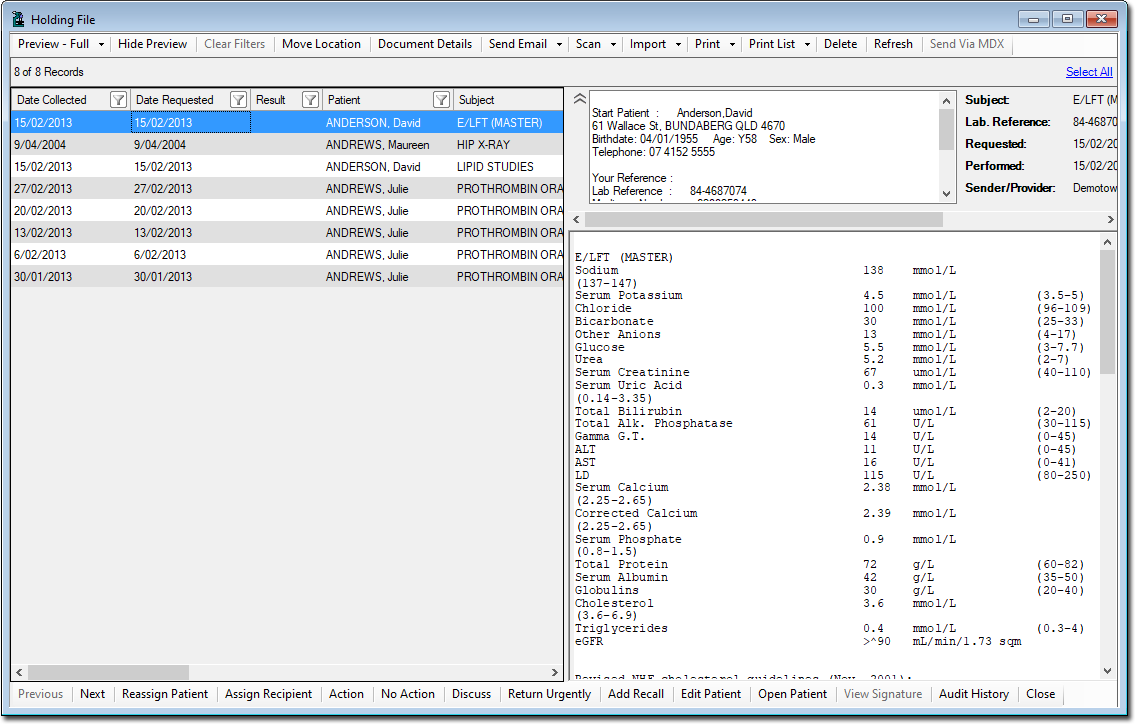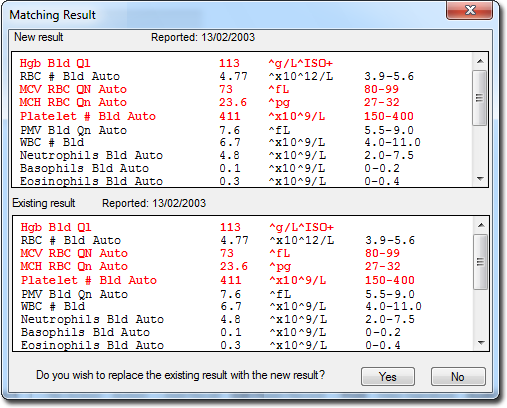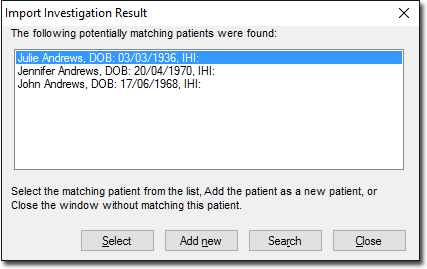Overview
Before a new Investigations Result can be transferred from the Holding File to a patient's record, the following steps must be taken:
Matching: MedicalDirector Clinical must know which patient the result belongs to.
Checking: A practitioner must make a visual examination of the result (as displayed) and make a notation based on their professional judgment.
When checking the results from the Holding File to the patient's record, results with TESTNAME Letter, Correspondence, Discharge Summary, Summary, or an empty field are stored in the Letter file not Results.
HealthLink RSDs always save to the Letters tab of the Clinical Window.
From within the Holding File, individual results can be examined. See the table below for information about how to manage this Result.

Items of interest on the Holding File window: Note that the range of options available to you will be limited by the level of access you have. See the Permissions Matrices below for more information. |
|
Upper Section |
|
Preview |
Controls the display of a selected document's details. Options are 'Full', 'Bottom', and 'Right'. The image above shows that 'Bottom' has been selected, and the details of the selected document are visible in the lower half (bottom) of the window. |
Hide/Show Preview |
Hides/Reveals the preview pane. |
Clear Filters |
Click the 'Clear Filters' button to clear all filters. When this button appears greyed-out, it indicates that no filters have been applied. |
Move Location |
Click to move selected Results to a specific tab within the patient's record. You can select from the Documents, Letters or Results tabs in the Clinical Window, or the ECG tab of the Tool Box. |
Document Details |
Click to edit the details of a selected Result. Use the button also to view large document descriptions. |
Scan |
Click to scan a document directly into the Holding File, after which you can assign the document to a patient, via the Document Details button (see above). |
Import |
Click to import a document directly into the Holding File, after which you can assign the document to a patient, via the Document Details button (see above). |
Print / Print To |
Prints every page of every multi-page document within every selected record;
|
Print List / Print List To |
Prints a list of selected documents. Note that the details of the selected documents are not displayed on the printout.
|
Delete |
Click to delete selected entries. |
Refresh |
Refreshes the window. |
Zoom |
Select a zoom option fro the drop-down list provided. Only available to records that can be zoomed, such as photographs. |
Open Externally |
Opens the selected document in the default third-party application, for viewing externally to Clinical. Only available to records that must be opened by a third-party application. |
|
|
Lower Section |
|
Previous/Next |
Click to scroll through the list of records, displaying the details of each, one-by-one. |
Assign/Reassign Patient |
Assigns the selected result to the patient. If no matching patient record can be found, you will be prompted to either add a new patient or search for an existing patient to match the result to. |
Assign/Reassign Recipient |
Click to assign the selected Result to a specific recipient. If the Result is already associated with a recipient, clicking this button allows you to assign it to another. |
Action |
Calls the Action window, which allows you to indicate which sort of action you would like to take regarding this Result. Such actions include 'Discuss', 'Return Urgently' and so forth. You can also create customised Actions, which will be saved for later use. For more information about Actions, see Adding Results Manually. Use this button also to view large comments. |
No Action |
Click to indicate that no actions are required regarding the selected Result. |
Discuss |
Click to indicate that you wish to discuss the result with the patient. |
Return Urgently |
Mark the selected item as 'Return Urgently'. |
Add Recall |
Click to create a Recall notification for the patient. |
Edit Patient |
If the demographic details on the Result are incorrect, i.e. they do not exactly match an existing patient in the database, you can edit the demographics in the result by clicking this button. Modify the details as required, ensuring that the information is correct for the intended patient. After editing, MedicalDirector Clinical will try to rematch with a patient in the database. |
Open Patient |
Click to open the clinical record of the patient associated with the selected record. |
View Signature |
Click to view details about the digital signature used for a selected e-mail in the Holding File, imported via MDExchange. |
Audit History |
Toggles half of the viewing area to display an audit trail of changes made to a selected Result. The following events are tracked:
|
Close |
Closes the Holding File. |
Dealing with Matching Results
There may be circumstances where a Result is imported to the Holding File that already matches one saved in the patient's record. A result is determined to be 'matching' when the date-of-request in the Result matches that of a Result saved in the patient's record.
This could occur if you have requested daily examinations over a period of time; Results for a sequence of tests like this would return daily, with the previous Results accumulating (i.e. the Result that arrives for day 3 also includes the Results for days 1 and 2). As such, it is only necessary to keep the final Result, as it includes all the Results in the sequence from day 1.
When a matching Result is discovered, you will be prompted (as shown below) to decide whether or not you wish to replace the existing Result with the new one.

Dealing with Partially-Matched Patients
When a Result is imported, Clinical attempts to automatically match it with a patient from the Patient Database, by comparing the demographics recorded in the Result with those in the Patient Database. Where there is not a direct match, you will be prompted to select the correct patient from those found to be similar. This anomaly can occur if the laboratory has misspelled the patient's name for example, or if the patient is not listed in your Patient Database.

Dealing with Results where no Matching Patient Record can be found
You will be prompted when no partially-matching patients are found. This allows you to add a new patient to the Patient Database, to assign this result to.
You will not be able to add a patient record using this mechanism if:
 next
to the Print button, you can specify where you want
to send the print job by calling the Windows print
window.
next
to the Print button, you can specify where you want
to send the print job by calling the Windows print
window.